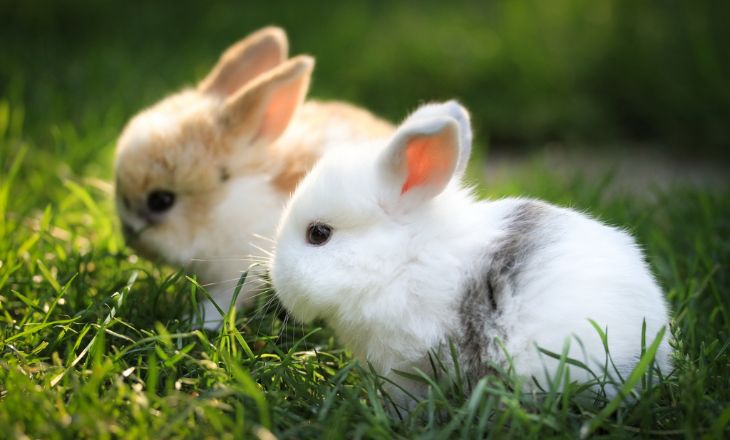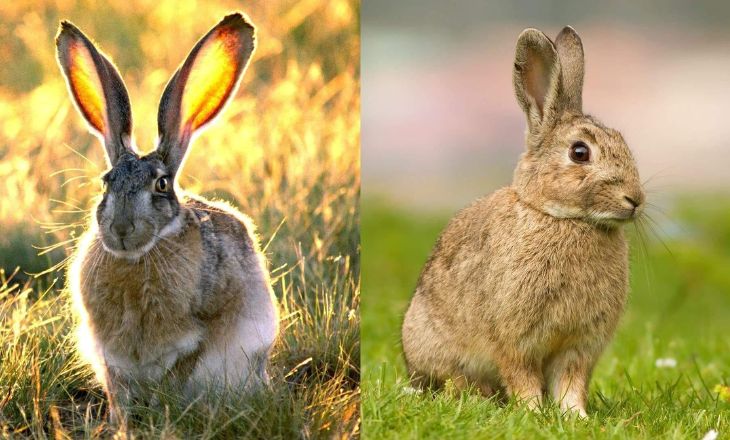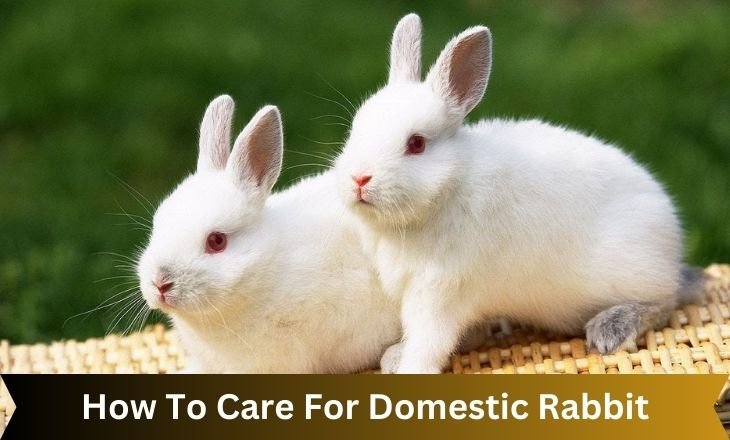Imagine a creature with soft fur, twitching whiskers, and a joyful habit of hopping around. This is the domestic rabbit, a charming pet that can bring happiness to any home. With their playful nature and gentle behaviour, rabbits have won the hearts of many pet lovers worldwide.
Caring for a domestic rabbit involves more than food and shelter; you must understand their needs and behaviours to help them thrive. This guide will share important tips for keeping your rabbit happy and healthy. From creating a stimulating environment to understanding their unique habits, our advice will help you build a strong bond with your furry friend.
Whether you are an experienced rabbit owner or thinking about getting one for the first time, get ready to explore the exciting world of rabbit care!
Domestic Rabbit Scientific Name
The domestic rabbit, also known as Oryctolagus cuniculus, has long been a popular pet. They are small and gentle but still have the instincts of wild European rabbits. People keep rabbits as pets and raise them for fur, meat, and scientific experiments.
Scientists study rabbits to learn about their biology, behaviour, and impact on the environment and people. Researchers are interested in rabbit genes to understand their colours and the likelihood of getting sick.
Understanding the scientific name of rabbits helps us appreciate these beloved animals worldwide.
Are Rabbits Good Pets
Rabbits are great pets for people and families looking for a furry friend. They are cute and offer good companionship. Rabbits have friendly personalities and can form strong bonds with their owners, showing love through nudges and cuddles.
Rabbit Baby
Baby rabbits, called kits, are born without hair and cannot see. They need their mother for warmth and food. As they grow, they get fur and show their personalities. Kits are very curious and like to explore and play.
A cool fact is that they are born with closed eyes to keep them safe in their burrow. As they get older, they open their eyes and see the world. It’s fun to watch baby rabbits play together and groom each other.

What Do Rabbits Eat
Rabbits eat plants like hay, grass, and leafy greens to stay healthy and avoid getting sick. They can also eat small amounts of vegetables like carrots, broccoli, and kale.
How To Take Care Of A Bunny
Caring for a bunny means more than just meeting their basic needs; it involves creating a healthy environment for their body and mind. Bunnies do best with routines, so having a regular feeding schedule can help reduce their stress.
Fresh hay should be the main part of their diet because it provides nutrition and satisfies their need to chew. Changing their vegetables to keep meals interesting and balanced is also important. Offer leafy greens like kale or romaine and occasional treats like carrots or bell peppers.
Social interaction is key to rabbit care, but it’s often overlooked. Spending time with your bunny through gentle grooming or play strengthens your bond and improves their emotional health. Providing safe play areas where they can hop and dig improves their lives. You can build tunnels or add climbing platforms to make their space exciting.
By taking this well-rounded approach to rabbit care, you are not just looking after a pet; you are nurturing a playful companion full of personality.
What Do Rabbits Drink
Rabbits need water to stay healthy. Make sure always to give your rabbit fresh water to prevent dehydration. Avoid giving rabbits milk or juice as it can upset their stomachs. Wild rabbits get water from plants, but pet rabbits need water from their owners.
Can Rabbits Drink Milk
Rabbits can’t digest milk because they are lactose intolerant. Giving them milk can cause stomach problems like diarrhoea and gas. Rabbits should eat hay, veggies, and some pellets instead of milk. Make sure they have enough water to stay hydrated and healthy.
How To Care For Rabbits
Give them a mix of hay, fresh veggies, and a few pellets to take care of a rabbit. Watch their weight and adjust their food. Always have clean water available. Make sure their living space is safe and roomy. Give them space to move and play, and keep them safe from other animals.
Rabbit House Cleaning
Keeping your rabbit’s hutch clean is important for their health and comfort. Use good bedding that is absorbent and easy to clean. Clean up any droppings or dirty bedding regularly to prevent smells and bacteria.
Give the hutch a thorough cleaning once a week by changing all the bedding, scrubbing surfaces with safe disinfectant, and ensuring good airflow.
Spay Rabbit
Spaying your rabbit is important for their health and behaviour. It prevents pregnancies and lowers the risk of cancer. It can also make your rabbit less aggressive and more friendly. Spaying helps keep your rabbit healthy and happy.
Small Animal Veterinarian
Small animal veterinarians care for pets like dogs, cats, rabbits, and guinea pigs. They work hard to keep animals healthy through check-ups and surgeries. These vets build relationships with pets and owners, offering advice on nutrition and behaviour.
Common Rabbit Illnesses
Rabbits can get sick with gastrointestinal stasis, also known as GI stasis. This happens when a rabbit’s digestion slows down or stops, causing symptoms like not eating much, feeling bloated, and tiredness. Rabbit owners should watch how much their pet eats and poops to spot GI stasis signs early.
Overgrown Teeth
Rabbits can get sick from dental problems like overgrown teeth or abscesses. Their teeth keep growing, so they need to chew on things to keep them short. If rabbits don’t have enough chances to grind their teeth, they can get painful dental issues that might need a vet’s help. Rabbit owners should give their pets lots of hay and chew toys to stop these problems.
Wild Rabbit Vs Domestic Rabbit
Wild rabbits are good at surviving in various places, finding food, and avoiding predators.
They are bred to be friendly and calm towards people, making them popular pets that depend on humans for food and shelter.
Wild rabbits are cautious around people, but they can also be affectionate and form bonds with their owners. Due to predators and dangers, wild rabbits live shorter lives, but they can live longer with proper care.
Both rabbits have unique traits that make them enjoyable to observe and interact with.

How Much Time Do Rabbits Sleep
Rabbits are cute and playful animals that sleep a lot. They can sleep 8 to 12 hours daily, which might be surprising because we usually see them as always moving.
Rabbits are most active in the early morning and evening, playing, eating, and exploring. They rest and sleep during the day to save energy for their active times.
How Long Do Rabbits Live As Pets
The lifespan of a pet rabbit depends on its breed, diet, and care. Indoor rabbits usually live longer than outdoor ones because they are safer from predators. A healthy rabbit can live 8 to 12 years or more with good food and regular vet check-ups.
Conclusion
Domestic rabbits maintain biodiversity and ecosystem balance within the Agri Preserve. Their presence contributes to the environment’s overall health and provides an opportunity for sustainable agricultural practices.
By understanding and appreciating rabbits’ importance in this unique setting, we can work towards creating a harmonious coexistence between humans and wildlife.
Let us continue to support conservation efforts and promote responsible stewardship of our natural resources, ensuring a thriving habitat for these beloved creatures for generations to come. Join us in protecting and preserving the precious habitat of rabbits at Agri Preserve!
Frequently Asked Question
What Is The Family Name Of The Rabbit?
Rabbits are small mammals in the family Leporidae, along with hares. They are also known as bunnies or bunny rabbits. Rabbits are part of the order Lagomorpha, which also includes pikas.
Can Rabbits Live Alone?
Rabbits are social animals and need companionship. In the wild, they live in family groups of up to 30 rabbits. If kept alone, they may start to act strangely, especially if they are alone for a long time.
What Are Rabbit Weaknesses?
Rabbits are easy targets for predators and diseases. Australia’s main predators are feral cats, foxes, and dingoes.
Do Rabbits Need Vaccines?
Vaccinations are very important because there are no effective treatments. You can get different vaccines for your rabbits. Combined vaccines protect against myxomatosis and R(V)HD every year. Rabbits can start getting vaccinated at five weeks old.

